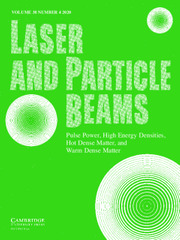Article contents
Gas–plasma and superlattice free-electron lasers exploiting a medium with periodically modulated refractive index
Published online by Cambridge University Press: 15 October 2009
Abstract
Free-electron lasers exploiting media with periodically modulated refractive indices are studied. The regime of large modulation is considered, and the conditions of its realization are discussed. Two types of media with periodically modulated refractive indices are analyzed: a gas-plasma medium with a periodically varying degree of ionization and a superlattice-like medium. The gain, saturation field, and efficiency of these free-electron lasers are found. For any given frequency, the gain is optimized with respect to the choice of electron energy, direction of motion, and other parameters. Its relationship with other types of free-electron lasers (e.g., the Cherenkov laser) is discussed.
- Type
- Research Article
- Information
- Copyright
- Copyright © Cambridge University Press 1998
References
REFERENCES
- 2
- Cited by


